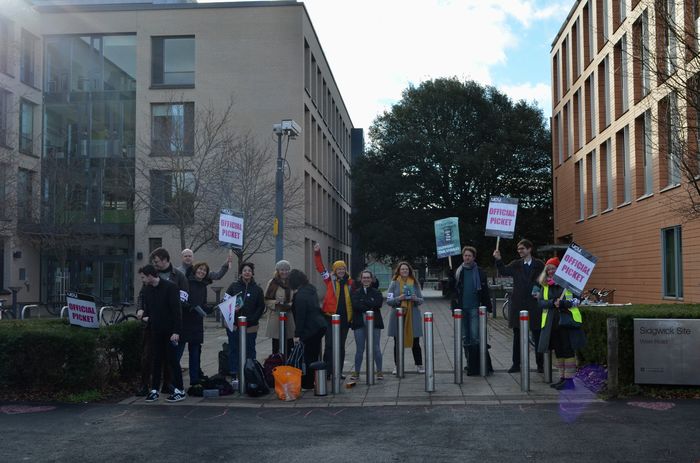In conversation with #Justice4CollegeSupervisors organiser Simina Dragos
The campaign organiser tells Rosa Phelps about the reality of working as a college supervisor and her campaign to change it

Simina Dragos knows the power of a good supervisor. “The people who had the greatest impact on my life were my supervisors when I was an undergraduate.” Thanks to them, she is now a PhD candidate at the Faculty of Education and an undergraduate supervisor herself. However, as is the case for many supervisors, Dragos says, her poor working conditions impede her ability to deliver the quality of education her students deserve. “You can’t teach your best when you are so underpaid and so stressed about the system.”
This is why she is now an organiser of #Justice4CollegeSupervisors, a UCU-affiliated campaign demanding fairer pay, secure contracts, and compensation for mandatory supervision training. The group, formally launched in 2021, primarily consists of PhD students “who do most of the supervising at the university”. In their most well-known action, they worked with the Guardian to expose the exploitation of ‘gig economy’ supervisors. Their demands were categorically rejected at the Senior Tutors’ Standing Committee on Education last year.
“You can’t teach your best when you are so underpaid”
J4CS is demanding a pay rise for supervisors. Currently, they are not paid by the hour, but per supervision. Their wage is calculated based on the assumption that they spend sixty minutes with students, thirty minutes preparing, and twenty minutes per student marking. According to Dragos, this is completely unrealistic: “If you actually prepare for only thirty minutes, you probably don’t even know what’s on the syllabus.” For some supervisors real pay is “not just below the living wage, it’s below the minimum wage.” The day before our meeting, Dragos herself spent an hour and a half marking an essay, saying: “I want to make sure that my students go into their finals prepared.” She stresses that not all academics have the same luxury of extra time. “The only reason I could do this is because I don’t have responsibilities which mean that I can’t work very long hours.” She considers how the unfair pay scale could also affect students: “The university is actively encouraging us to be superficial and not to put a lot of effort in.”
Another of the campaign’s demands is to gain secure contracts for all supervisors. Supervisors have no contracts with colleges and are considered freelance workers. What does this entail? “No benefits. No sick pay, no holiday pay, no pension,” Dragos says. They also have no right to negotiate with colleges. “We can’t go on strike because we’re not employed.” Supervisors are nominally paid for a term’s work after submitting CamCORS reports. In actuality, Dragos reveals, each college pays at different (and unspecified) times. Dragos has colleagues who have experienced delays of up to nine months. “You just randomly get money in your bank account, which makes it completely impossible to do any sort of financial planning.” She describes the system as “completely classist”. “We see this assumption that supervision money is pocket money, that it’s not a real wage.” “If you had a secure contract, the college wouldn’t be able to pay you whenever they feel like it.”
J4CS is also demanding that the university compensate supervisors for completing (currently unpaid) mandatory training. Before beginning to teach, each supervisor must spend a day learning about pedagogy and professionalism. The campaign estimates the annual university-wide cost of paying supervisors for this would come to £35,000 (less than a thirteenth of Stephen Toope’s annual salary) and they want the university to provide this from next academic year. “Some colleges spend more than that on wine – it’s just ridiculous.”
“If you had a secure contract, the college wouldn’t be able to pay you whenever they feel like it”
“It’s a huge issue how much this is unknown in Cambridge,” especially among undergraduates, Dragos says. I ask her how students can support their supervisors. “The most important thing is for students to inform themselves.” She recommends that students ask supervisors about their working conditions. “If you think that’s unfair, email your senior tutor and bursar to say so, because they decide on pay.” She also encourages students to push their JCRs to pass motions in support of the campaign (as several have already done).
J4CS’s latest initiative is a postcard campaign. “We want as many supervisors as possible to get involved in it and to sign.” Each postcard they distribute outlines their key demands and explains: “I need fair pay and job security to provide high quality teaching to my students.” The signed postcards will be delivered to the university administration during the upcoming strike. “We’re trying to get the university to commit to the paid training and to begin negotiations on pay and on secure contracts.”

In Dragos’s view, colleges have a lot to answer for. After all, “if Cambridge is really the collection of the brightest minds, why can’t it have an academic system that is fair? Especially given how much they emphasise the uniqueness of supervisions and the tailored learning experience.” Until the fairer system she is seeking is introduced, Dragos will be attending rallies, collecting signatures and distributing postcards, waiting for the colleges to answer her question.
 News / Clare Hall spent over £500k opposing busway 24 December 2025
News / Clare Hall spent over £500k opposing busway 24 December 2025 Comment / The ‘class’ of Cambridge24 December 2025
Comment / The ‘class’ of Cambridge24 December 2025 News / Eight Cambridge researchers awarded €17m in ERC research grants27 December 2025
News / Eight Cambridge researchers awarded €17m in ERC research grants27 December 2025 News / Caius mourns its tree-mendous loss23 December 2025
News / Caius mourns its tree-mendous loss23 December 2025 Comment / League tables do more harm than good26 December 2025
Comment / League tables do more harm than good26 December 2025









